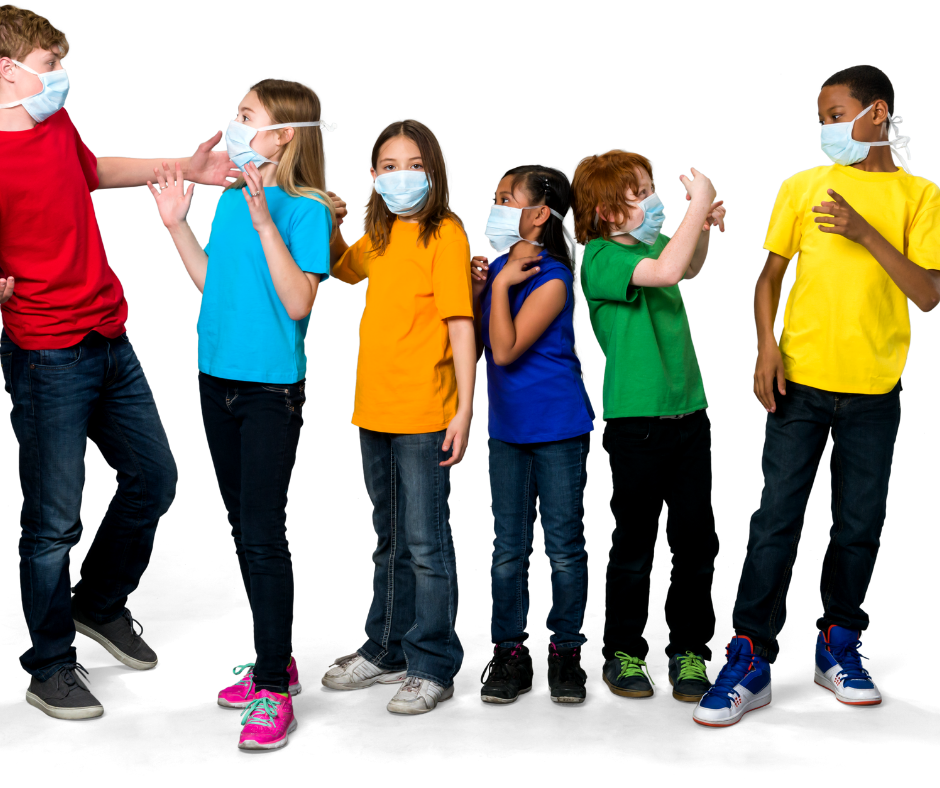In an effort to slow the transmission of COVID-19 and its variants, children have been required to wear face masks throughout the school day. Through teacher interviews, we find that the restrictions are having a negative impact on the social skills of young children.
While children are wearing masks and being instructed to maintain a distance from one another, here’s what teachers observe:
- “Children are less comfortable approaching a group to play a game.”
- “Some children are hesitant to start a conversation with a peer.”
- “Many students don’t feel comfortable resolving simple playground upsets.”
- Teachers share that their students are fearful of getting sick as a result of engaging with other children. One teacher said, “We see children have difficulty reading the facial expressions of peers and, therefore, some opt to play alone.”

Children learn so much by reading facial cues and interacting naturally with others. Since the mask mandate is not going away any time soon in the L.A. area, we recommend that parents help fill in the gaps at home. The good news is that this can be accomplished with just a few minutes of support. Meaningful interactions will enable your child to practice the “serve and return” of a conversation. These interactions will also help to expand your child’s expressive abilities, develop flexible thinking, build vocabulary, foster empathy, promote kindness, teach gratitude and encourage imagination. Like any skill, the more you practice, the more comfortable your child will be at making friends and collaborating with others.
What you can do
The following suggestions go a long way towards developing friends, collaborating and mastering social skills:
- Ask children open-ended questions to encourage thought expression. If it can be answered by “Yes” or “No,” it is not open-ended.
- Be patient and take turns sharing thoughts. Do not interrupt or finish sentences for your child.
- Be an active listener by making eye contact with the speaker, even if it means bending down to the child’s level.
- Model how to respectfully express an opinion.
- Welcome your child’s perspectives.
- Play board games and card games that require turn taking.
- Occasionally have the adults choose the game.
- Redirect things when one person in the family dominates or insists on having their way.
- When playing a game, it’s good for the adult to occasionally win.
- When the child is not the winner, encourage the fun of playing and of trying again next time.
- Show how to share graciously (e.g. “It looks like you need a few more blocks. I have extras!”).
- Praise your child for working well with others and explain how far that goes towards making friends.
- Model good sportsmanship whether you win or lose, and remark about how much you enjoyed the game and time with them.
- Try to make this a no cell phone and no interruption time.
Practice fun conversation starters
Practice and enhance communication by having meaningful friendly conversations at home.
Here are some sample starters:
- What do you think our dog (cat/hamster) does while you are at school?
- If you could have a superpower, what would you wish for? And how would you use it?
- What do you love about your birthday?
- If you could be any animal in the world, what would you be, and, why?
- If you were going to Mars, what would you take with you?
- What is your favorite game to play at school? How do you play it?
- What do you like about your teacher?
- What was the highlight of recess today?
Practice collaboration by playing games
Encouraging friends to do well is an essential part of being a good friend. Currently, our children have less practice cooperating with others because of the distancing rules and guidelines about playdates.
While playing the following games, adults foster kindness, empathy and good sportsmanship.
- Uno — This card game requires strategy and turn taking. Occasionally, a child may need to skip a turn or be called upon to reverse direction. This helps your little one to be patient and resourceful. Often, when parents play games with children, they allow the child to win. At school, this won’t always be the case, so let’s practice learning these skills at home.
- Go Fish — Here’s a card game where participants need to match pairs and learn to tolerate missing a turn when another player “makes a pair” and gets an extra turn.
- Don’t Break the Ice — This is a fun game where players take turn tapping out plastic ice cubes in an effort to keep Phillip the Penguin from falling into the cold water! Children can learn good sportsmanship by helping each other, while alternating who has a go at keeping Phillip on the ice.
- Guess in 10 — In this game, players are tasked with guessing which animal is on a card that they cannot see. This is a great game to play in teams so children can learn teamwork as they decide which questions to ask, such as “Does this animal live on the land?” or “Is this animal nocturnal?”
- Headbanz — Here’s another fun guessing game, where participants need to guess what object they have appearing in their headband, which they cannot see. Others give clues to help the child who is guessing to find out if they are a strawberry, chair or rhino. This gives children the opportunity to help each other solve a problem with no need to keep score…just enjoy the laughs as the players help each other.
Engage in dialogues and games with your young children and see their skills of collaboration and communication soar!
Susan Rudich is a child development specialist and parenting coach who can be reached at susanrudich@yahoo.com. Patricia Ainsa is an early intervention professor at the University of Texas at El Paso who can be reached at tainsa@utep.edu.






















